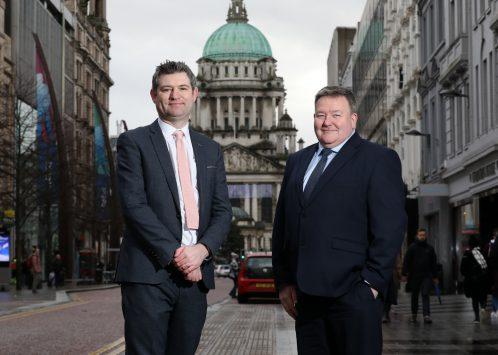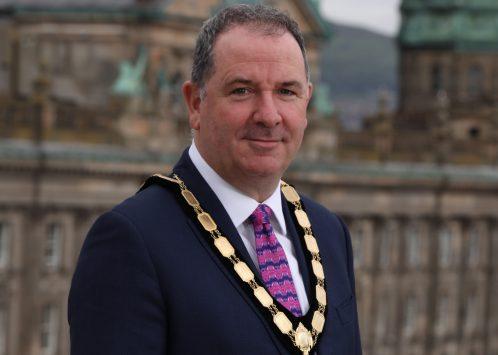- All key economic indicators positive in Q4 21, signaling improving trading conditions
- 70% of NI Chamber members expect their business to grow in 2022
- More businesses are reporting increased UK sales (35%) in the last three months compared to those reporting falling sales (18%)
- 74% expect to raise prices in the next three months – the highest figure on record
- 72% are trying to recruit, with 86% facing recruitment difficulties
Download a copy of the report here.
Most businesses in Northern Ireland expect to grow in 2022, according to the findings of the latest Quarterly Economic Survey (QES) published today (12 January 2022) by Northern Ireland Chamber of Commerce and Industry (NI Chamber) and BDO NI. The findings have been welcomed by Minister for the Economy, Gordon Lyons MLA, who issued a separate statement following publication of the report.
However, inflationary pressures from mounting business costs including high raw material costs and pressure to raise wages are causing significant concern, particularly for manufacturers. Expectations to raise prices are the highest on record, with a greater share of businesses in Northern Ireland expecting to raise prices in the next three months compared to all other UK regions.
The share of businesses operating at full capacity rose to 45% in Q4 21 (39% in Q3 21) for manufacturing and 50% for services (47% in Q3 21), although over half of businesses are still operating below capacity.
Confidence and investment intentions
Confidence around turnover prospects for businesses in the next 12 months has been improving after the striking collapse in confidence brought about by the pandemic.
Q4 21 saw a particularly strong resurgence in confidence among manufacturers, with the balance of manufacturers confident that turnover will grow at its highest level in the last four years. The turnover confidence balance for manufacturing rose to +51% in Q4 21 (+24% Q3 21) and for services to +42% (+39% Q3 21). Confidence around profitability in the next 12 months remains a weaker indicator but is positive. The balance was +1% for manufacturers in Q4 21 (-3% Q3 21) meaning that a similar share of manufacturers are expecting profitability to rise as to fall in the next 12 months. The corresponding figure for services was more positive but low at +11%.
Prices
Expectations to raise prices remain the highest on record (2008) and are particularly acute for manufacturers. 83% of manufacturers (60% in Q3 21) and 66% of services (60% Q3 21) expect to raise prices in the next three months. 93% of manufacturers are experiencing pressures from rising raw materials costs. There is also growing pressure on prices because of increased wage settlements for both manufacturers and services firms. The NI manufacturing sector recorded higher pressures from wage settlements compared to all other UK regions in Q4 21. Inflation is a concern for 76% of members.
Cash flow
Cash flow is typically one of the weakest performing key indicators in the Northern Ireland QES. In Q4 21, the manufacturing cash flow balance became positive at +4% (-5% Q3 21) for the first time since Q3 2018, suggesting a better cash flow position for manufacturers in spite of COVID-19 and EU exit. In services, the balance remained positive at +2%, although down from +11% in Q3 21.
Recruitment
In Q4 21, 80% of manufacturers and 66% of services were trying to recruit. This had fallen to just 27% of manufacturers and 21% of services in Q2 20. Expectations around employment growth are currently highest on record for local manufacturers.
However, recruitment difficulties remain one of the most persistent and growing concerns among members. In Q4 21 86% of manufacturers and 80% of services were finding it difficult to get staff. This also represents the highest share of manufacturers experiencing recruitment difficulties on record.
Manufacturing
Recovery in manufacturing picked up in Q4 21, although inflationary pressures continued to escalate. Almost all key indicators improved over the quarter, particularly strongly in terms of employment expectations and confidence around turnover growth in the next 12 months.
Investment intentions are at their strongest level in the last six years. However, there is significant pressure on manufacturers to raise prices, with 83% of manufacturers expecting to raise prices in the next three months. Rising raw material costs is the key driver.
Services
The Q4 21 trading environment for services was more challenging, after what had been the strongest trading performance from the service sector in Q3 21 since the onset of the pandemic.
Most key indicators fell in Q4 21, particularly around domestic and export trade. Although all 11 key balances remained positive, meaning more firms are expanding rather than contracting. This means that more members are reporting improvements in domestic sales/orders, export sales/orders and cash flow than those reporting any fall. Recruitment activity remains high and Northern Ireland is the strongest performing UK region in terms of investment in training. Pressure on prices is highest on record and inflation (76%) is a much greater concern compared to the UK average (66%).
Brexit and the NI Protocol
In the Q4 21 survey, firms were asked about the overall impact of EU exit on business performance over the last year. 23% of firms said it had a major negative impact on business, 39% a minor negative impact, with 21% stating it has had no impact to date. There has been a minor positive impact for 7% of businesses and a major positive impact for 3%.
Businesses were also asked how they have adjusted to new trading arrangements. In Q4 21, 57% said that they had adapted to the new trading arrangements (compared to 45% in Q3 21, 44% in Q2 21 and 15% in Q1 21). There is a core of around 15% of businesses that are finding the new trading arrangements extremely challenging (13% Q3 21).
In terms of resolving issues that have emerged with the NI Protocol, 39% of members believe that these issues can be resolved in the next year, while 31% do not believe that they can within that time frame.
Prospects for 2022
The outlook for business and the economy for 2022 is much more positive than has been the case in recent years. 58% of members believe the Northern Ireland economy will grow in 2022, up from just 19% for 2021. However, there is still quite a sizeable minority, 1 in 4 (24%), who believe that the Northern Ireland economy will contract in 2022.
Businesses are particularly optimistic around their own prospects, albeit that for some businesses this is coming from a particularly challenging trading position in the last two years. 70% believe their business will grow in 2022, up from 44% in 2021. In fact, 12% believe that their business will grow strongly this year. However, 1 in 7 (14%) believe that their business will contract in 2022. Only 1% believe their business will decline strongly, the lowest recorded figure since prospects were first recorded in 2017.
Commenting on the survey findings, Ann McGregor, Chief Executive, NI Chamber said: “It is encouraging to see that confidence is keeping up in spite of challenges, particularly around pressure to raise prices. These quarterly economic survey results indicate that there is much to be optimistic about at the beginning of this New Year. However, while there are many positives, we must also be realistic about the fact that multiple, serious challenges persist.
“We know from members that inflationary pressures are very acute at the moment. Rising raw material costs are significant, particularly for manufacturers, driven by factors including COVID-19, supply chain disruption and EU exit. There also appears to be growing pressure on businesses to raise wages.
“At some point, firms have to pass on these cost increases and what we are now seeing is that expectations to raise prices are the highest on record among our members. A bigger share of businesses in Northern Ireland are expecting to raise prices in the next three months compared to all other UK regions, which could damage our regional competitiveness over time.
“It is clear that adapting to new trading arrangements has been a challenge for many and that outstanding issues with the NI Protocol need to be resolved. Despite this, survey responses in Q3 21 indicated that almost 70% of our members believed that the unique trading position as a result of the NI Protocol presents opportunities for the region.
“As the UK and EU negotiators resume their discussions, we urge them to come to a timely and clear agreement to give businesses the clarity and certainty they need and that they build in transition periods to avoid further cliff edge deadlines.”
Brian Murphy, Managing Partner, BDO NI concluded: “What a difference a year makes. It’s encouraging to see that many businesses have reported an increase in sales, employment, and investment confidence in Q4, this is the strongest foundation for recovery that we have seen since the start of the pandemic. Considering the scale of the challenges that have been faced in the last two years, to be in this position of strength is a real testament to the resilience, commitment and adaptability of the NI business community.
“If we compare this to Q4 of 2020, when almost all key indicators were negative, this is a reassuringly positive sign for the local economy. Particularly as we move towards a new phase of living and working with the pandemic, rather than in spite of it.
“Businesses throughout 2021 had been dealing with increased pressures on a range of costs, which are unfortunately expected to continue. With rising energy costs, pressures on outlays for raw materials and increased wage demands, it is no surprise that companies are under pressure to raise their own prices.
“A reminder, not that any of us need it, that all of these challenges are on top of the evolving Covid-19 situation. How companies balance these demands will dictate how they can transform this growing confidence into actual sustainable growth.
Download a copy of the report here.
Read reaction from Economy Minister Gordon Lyons here.



